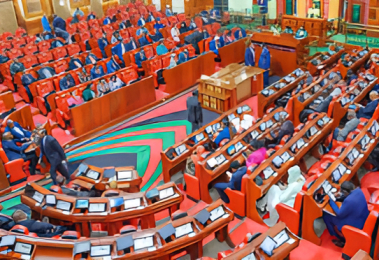The electoral body has confirmed that Kenyans currently have no legal means to recall their Members of Parliament or Senators, despite a constitutional right allowing such action, because of a gap in the law that Parliament has failed to address since 2017.
In a statement on Wednesday, the Independent Electoral and Boundaries Commission (IEBC) explained that while Article 104 of the Constitution gives voters the power to recall elected leaders, the lack of a clear and valid legal framework makes it impossible to carry out the process for MPs and Senators.
IEBC chairperson Erastus Ethekon said the Commission supports this right in principle, but cannot act beyond what the law permits.
“The Commission stands ready to facilitate the process without fear, favour, or hindrance,” Ethekon said. However, he added that this only applies in cases where the law is in place, which for now includes Members of County Assemblies (MCAs) but not Parliamentarians.
The Commission said it is already handling petitions for the recall of some MCAs where the legal requirements have been fulfilled. “The Commission is actively processing petitions for recall where validly submitted,” Ethekon said. “But for MPs and Senators, the situation is different.”
According to the Commission, the current legal impasse began with a 2017 decision by the High Court in a case filed by Katiba Institute and Transform Empowerment for Action Initiative (TEAM) against the Attorney General.
In that ruling, the court struck down parts of the Elections Act that had set out procedures and grounds for recalling MPs, declaring them unconstitutional for being discriminatory.
Although the Elections Act was later amended to address recalls for MCAs, no new law was passed to cover MPs and Senators. As a result, the Commission said it has no legal basis to process the four recall petitions it has recently received for Members of Parliament.
Speaking to the press, Ethekon said the Commission will examine the four petitions “but within the limits of existing law.”
The development has drawn sharp criticism from the Law Society of Kenya (LSK), which blamed Parliament for its failure to restore the legal framework needed to enforce Article 104.
“Unfortunately, the necessary legal reconciliation was never done,” said LSK President Faith Odhiambo. “As a result, the right has been suspended both in law and practice.”
Odhiambo warned that the absence of a legal path to recall undermines the principles of democracy and the sovereignty of the people as stated in Article 1 of the Constitution.
Attention has now shifted to the Elections (Amendment) Bill, Senate Bill No. 29 of 2024, which is currently awaiting its second reading in the National Assembly.
The Bill aims to align the Elections Act with the court ruling by removing the nullified sections and introducing revised guidelines for the recall process.
Even so, the LSK has raised fresh concerns that the Bill could introduce new hurdles instead of restoring accountability. “The disturbance of the threshold for removal is unnecessary and was not contemplated by the Court,” Odhiambo said.
“Parliament must uphold the true spirit and intent of Article 104 and Chapter Six of the Constitution on leadership and integrity.”
The IEBC noted that it has already made formal submissions to Parliament urging lawmakers to pass new legislation that will allow the recall of MPs and Senators. Until then, it says, it is powerless to act on citizen petitions.
In September 2024, KMK Africa Advocates LLP formally sought clarity from the Commission on how to initiate the recall of a Senator.
In response, IEBC Secretary Marjan Hussein confirmed that although Article 104 and the Elections Act provide the framework in theory, key sections, particularly Sections 45 to 48, were rendered ineffective by the court ruling.
Marjan added that the previous requirement to file recall petitions in court was also struck down, leaving no existing legal process for addressing such petitions.
